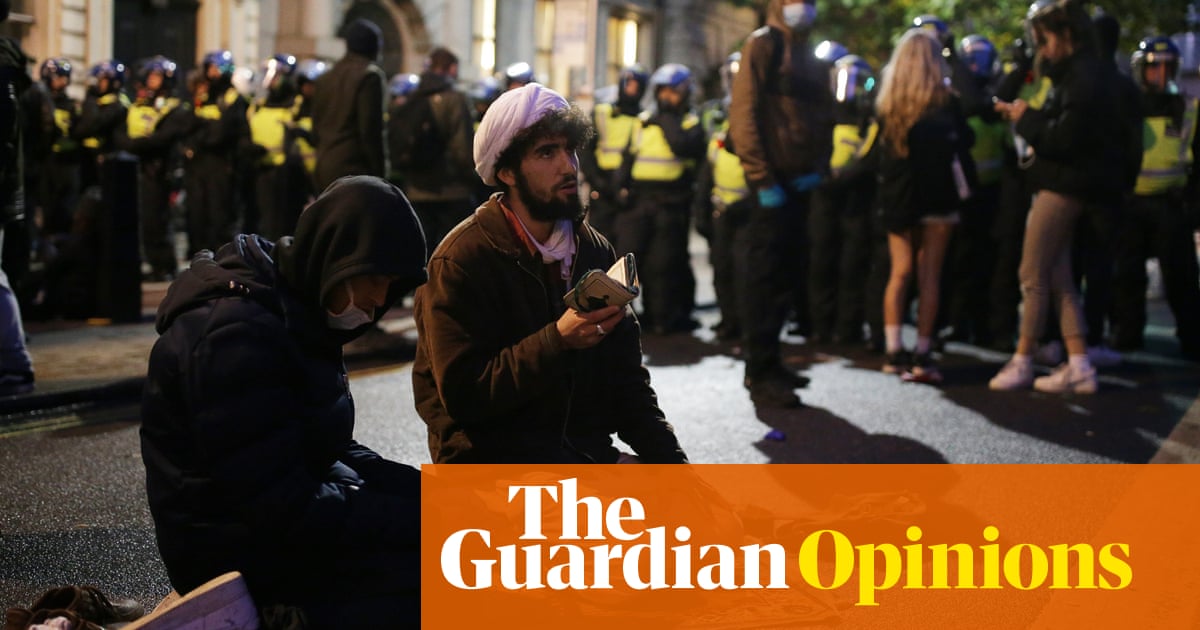
Show caption Two Muslim men kneel and pray during a Black Lives matter march in London in 2020. Photograph: Luke Dray/Getty Images Opinion Look at ministers’ plans to secretly make Britons stateless and what do you see: Islamophobia Suhaiymah Manzoor-Khan The idea is the result of toxic perceptions about Muslims and people of colour. It shows how prejudice creates shameful policy Mon 14 Mar 2022 08.00 GMT Share on Facebook
Share on Twitter
Share via Email
We are woefully underserved by the current conversation about Islamophobia. In recent weeks, the debate has hinged on whether or not the government’s decision to introduce new national counter-extremism legislation on the basis of the bogus “Trojan horse” letter, which was full of anti-Muslim tropes, was Islamophobic. Research has suggested that middle-class Britons hold more prejudiced views of Islam than any other social group. And a Tory minister recently alleged she was sacked for her “Muslimness”. In all these stories, Islamophobia is approached at worst as a political gaffe, and at best a moral failing, allegation or faux pas.
At the same time, mainstream news outlets have reported that Russia’s war in Ukraine is horrific because it is taking place somewhere that is “not like Iraq or Afghanistan”. Journalists have suggested that Ukrainian refugees deserve to be welcomed because they are “not from Syria”. Such coverage is not only shot through with Islamophobia, but premised upon it. References to Iraq, Afghanistan and Syria evoke wars associated with Muslims that the west justified through its “war on terror”. Unlike “westerners”, a racially and religiously coded marker that one reporter helpfully clarified as meaning Christian and white, the characterisation of Muslims as deserving of, or at least predisposed to, violence means our lives do not carry the same value. We cannot be deemed victims of occupation or war in the same way as Europeans.
War is often assumed the natural destiny or perpetual condition of predominantly Muslim countries and their people. As such, the right of Muslims to live free from war and persecution is thrown into doubt. This dynamic is not unique; we have seen it play out in the familiar devaluation of Black lives, too. It is the same dynamic that global border controls reinforce, and which we are witnessing currently in the war in Ukraine, where African students have been actively denied escape routes from war. For Black Muslims, dehumanisation is always compounded – where was the anti-war and pro-refugee sentiment when the US bombed Somalia at the same time that Russia invaded Ukraine?
These forms of dehumanisation are all manifestations of white supremacy. Discussing Islamophobia as an embarrassing faux pas at the middle-class dinner table is an astounding diversion from this fact. The ideology of white supremacy devalues lives and justifies dispossession and persecution. It has clear ramifications within Britain: as we speak, the nationality and borders bill is in its final phase in parliament. The controversial clause 9, which the House of Lords has rejected but MPs are yet to agree upon, allows the home secretary to secretly strip people of their citizenship without notifying them. The policy builds on years of extraordinary expansion to such powers, notably the Immigration Act 2014, which allowed the British government to revoke citizenship on often secret grounds, so long as they are “satisfied” that a person will not be made stateless. Making a person stateless is against international law, but this act created a loophole for deprivation of British citizenship even when a person has no citizenship in any other state.
Such measures disproportionately target people of colour. The state assumes that we will be eligible for citizenship in other countries (even if we have never visited them). United Nations experts are clear that this specifically threatens the human rights of people of colour “and especially people from Muslim and migrant communities”. Clause 9 is a human rights abuse. Consider the fact that several British Muslims who have reportedly travelled to Syria to distribute aid have had their citizenship stripped and been made stateless. Human rights only apply if you are seen first as human.
Islamophobia is not the preserve of a fringe group. It is the common language of the political and media establishment. You are less likely to lose your job over Islamophobia than retain it – Michael Gove remains a top government minister despite ignoring police recommendations that the “Trojan horse” letter was bogus, and pursuing an Islamophobic agenda that has devastated communities in Birmingham. Islamophobic sentiments can even help you become president or prime minister.
Islamophobia flourishes, despite the violence it leads to. The recent People’s Review of Prevent painstakingly documented how the government’s Prevent programme undermines safeguarding and free speech. Hundreds of academics and organisations, such as Amnesty, have long agreed that it encourages discrimination. Elsewhere in the world, Muslims are being directly persecuted. Recently, India’s ruling party shared a cartoon on Twitter of Muslims being lynched. Experts warn that calls for anti-Muslim violence have put the country on the path to genocide. Where is the outcry from European states?
Mainstream conversations about Islamophobia reflect a racist disregard for life. This is upheld in basic understandings about when violence is justified and when it is not, who can cross borders, whose deaths deserve inquiry, whose citizenship is a right and whose can be stripped away. White supremacy and Islamophobia colour our approach to all of these issues and more. Without confronting this, we will continue down a slippery path. The secret removal of Muslim people’s citizenship brings us one step closer to disappearing Muslims by other means.
Suhaiymah Manzoor-Khan is a poet, educator and author of Tangled in Terror: Uprooting Islamophobia








